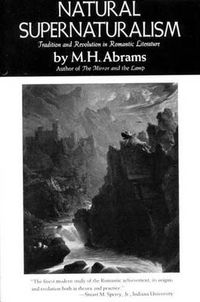
endast ny
Natural Supernaturalism Upplaga 4
In this remarkable new book, M. H. Abrams definitively studies the Romantic Age (1789 1835) the age in which Shelley claimed that "the literature of England has arisen as it were from a new birth." Abrams shows that the major poets of the age had in common important themes, modes of expression, and ways of feeling and imagining; that the writings of these poets were an integral part of a comprehensive intellectual tendency which manifested itself in philosophy as well as poetry, in England and in Germany; and that this tendency was causally related to drastic political and social changes of the age. But Abrams offers more than a work of scholarship, for he ranges before and after, to place the age in Western culture. he reveals what is traditional and what is revolutionary in the period, providing insights into those same two forces in the ideas of today. He shows that central Romantic ideas and forms of imagination were secularized versions of traditional theological concepts, imagery, and design, and that modern literature participates in the same process. Our comprehension of this age and of our own time is deepened by a work astonishing in its learning, vision, and humane understanding."
Upplaga: 4e upplagan
Utgiven: 1973
ISBN: 9780393006094
Förlag: WW Norton & Co
Format: Häftad
Språk: Engelska
Sidor: 560 st
In this remarkable new book, M. H. Abrams definitively studies the Romantic Age (1789 1835) the age in which Shelley claimed that "the literature of England has arisen as it were from a new birth." Abrams shows that the major poets of the age had in common important themes, modes of expression, and ways of feeling and imagining; that the writings of these poets were an integral part of a comprehensive intellectual tendency which manifested itself in philosophy as well as poetry, in England and in Germany; and that this tendency was causally related to drastic political and social changes of the age. But Abrams offers more than a work of scholarship, for he ranges before and after, to place the age in Western culture. he reveals what is traditional and what is revolutionary in the period, providing insights into those same two forces in the ideas of today. He shows that central Romantic ideas and forms of imagination were secularized versions of traditional theological concepts, imagery, and design, and that modern literature participates in the same process. Our comprehension of this age and of our own time is deepened by a work astonishing in its learning, vision, and humane understanding."
Ny bok
434 kr456 kr
5% studentrabatt med Studentapan
Begagnad bok (0 st)
Varje vecka tillkommer tusentals nya säljare. Bevaka boken så får du meddelande när den finns tillgänglig igen.



